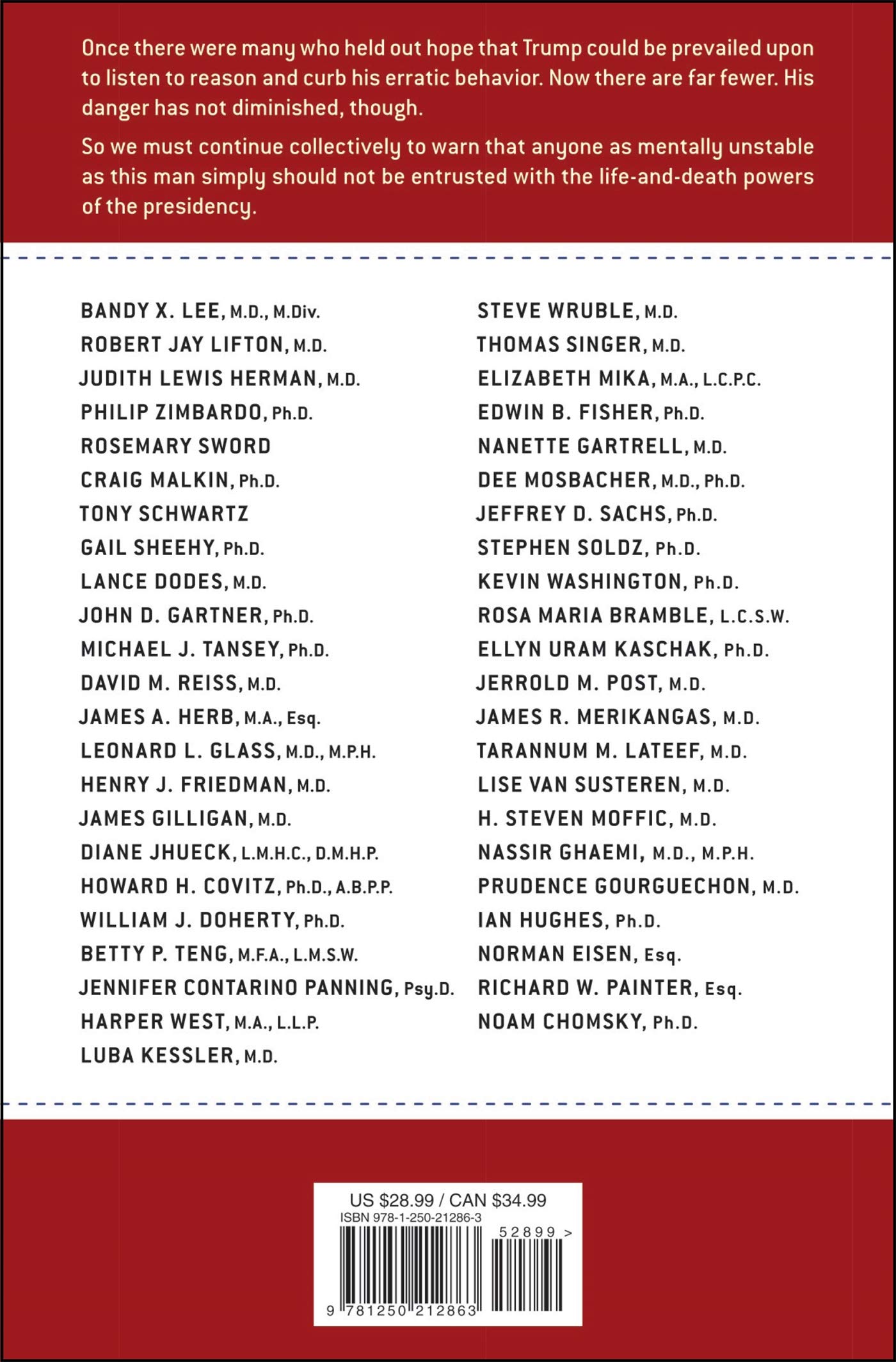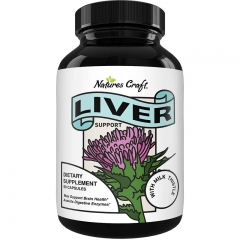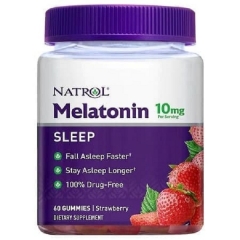-
 Thanh toán đa dạng, linh hoạtChuyển khoản ngân hàng, thanh toán tại nhà...
Thanh toán đa dạng, linh hoạtChuyển khoản ngân hàng, thanh toán tại nhà... -
 Miễn Phí vận chuyển 53 tỉnh thànhMiễn phí vận chuyển đối với đơn hàng trên 1 triệu
Miễn Phí vận chuyển 53 tỉnh thànhMiễn phí vận chuyển đối với đơn hàng trên 1 triệu -
 Yên Tâm mua sắmHoàn tiền trong vòng 7 ngày...
Yên Tâm mua sắmHoàn tiền trong vòng 7 ngày...
The Dangerous Case of Donald Trump: 37 Psychiatrists and Mental Health Experts Assess a President - Updated and Expanded with New Essays
-

- Mã sản phẩm: 1250212863
- (3463 nhận xét)

- Publisher:Thomas Dunne Books; Expanded,Updated edition (March 19, 2019)
- Language:English
- Hardcover:544 pages
- ISBN-10:1250212863
- ISBN-13:978-1250212863
- Item Weight:1.64 pounds
- Dimensions:6.47 x 1.69 x 9.6 inches
- Best Sellers Rank:#42,372 in Books (See Top 100 in Books) #70 in United States Executive Government #138 in Political Commentary & Opinion #209 in Popular Psychology Pathologies
- Customer Reviews:4.6 out of 5 stars 3,450Reviews

Mô tả sản phẩm
About the Author
Bandy X. Lee, M.D., M.Div., is a Forensic Psychiatrist at Yale School of Medicine and a Project Group Leader for the World Health Organization Violence Prevention Alliance. She earned her degrees at Yale, interned at Bellevue, was Chief Resident at Mass. General, and was a Research Fellow at Harvard Medical School. She was also a Fellow of the National Institute of Mental Health. She has taught at Yale Law School for more than fifteen years and has spearheaded a number of prison reform projects around the country, including of the notorious Rikers Island jail of New York City. She’s written more than one hundred peer-reviewed articles and chapters, edited more than a dozen academic books, and is author of the textbook Violence.
Robert Jay Lifton, M.D., is Lecturer in Psychiatry at Columbia University and Distinguished Professor Emeritus of John Jay College and the Graduate Center of the City University of New York. A leading psychohistorian, his renown comes from his studies of the doctors who aided Nazi war crimes and from his work with Hiroshima survivors. He was an outspoken critic of the American Psychological Association’s aiding of government-sanctioned torture, as he is a vocal opponent of nuclear weapons. His research encompasses the psychological causes and effects of war and political violence and the theory of thought reform.
GailSheehy, Ph.D., as author, journalist, and popular lecturer, has changed the way millions of women and men around the world look at their life stages. In her 50-year career, she has written 17 books, including her revolutionary Passages, named one of the ten most influential books of our times. As a literary journalist, she was one of the original contributors to New York Magazine and to Vanity Fair since 1984. A winner of many awards, three honorary doctorates, a Lifetime Achievement Award in 2012 by Books for a Better Life, she has regularly commented on political figures, including in her acclaimed biography of Hillary Clinton.
William J. Doherty, Ph.D., is a Professor of Family Social Science and Director of the Minnesota Couples on the Brink Project and the Citizen Professional Center at the University of Minnesota. In May 2016, he authored the Citizen Therapist Manifesto Against Trumpism, which was signed by over 3,800 therapists. After the election, he founded Citizen Therapists for Democracy. He is a Senior Fellow with Better Angels, an organization devoted to depolarizing America at the grass roots level. He helped pioneer the area of medical family therapy, and in 2017 received the American Family Therapy Association Lifetime Achievement Award.
Noam Chomsky is the author of numerous bestselling political works, including Hegemony or Survival and Failed States. A laureate professor at the University of Arizona and professor emeritus of linguistics and philosophy at MIT, he is widely credited with having revolutionized modern linguistics. He lives in Tuscon, Arizona.
Product Description
As this bestseller predicted, Trump has only grown more erratic and dangerous as the pressures on him mount. This new edition includes new essays bringing the book up to date―because this is still not normal.
Originally released in fall 2017, The Dangerous Case of Donald Trump was a runaway bestseller. Alarmed Americans and international onlookers wanted to know: What is wrong with him?
That question still plagues us. The Trump administration has proven as chaotic and destructive as its opponents feared, and the man at the center of it all remains a cipher.
Constrained by the APA’s “Goldwater rule,” which inhibits mental health professionals from diagnosing public figures they have not personally examined, many of those qualified to weigh in on the issue have shied away from discussing it at all. The public has thus been left to wonder whether he is mad, bad, or both.
The prestigious mental health experts who have contributed to the revised and updated version of The Dangerous Case of Donald Trump argue that their moral and civic "duty to warn" supersedes professional neutrality. Whatever affects him, affects the nation: From the trauma people have experienced under the Trump administration to the cult-like characteristics of his followers, he has created unprecedented mental health consequences across our nation and beyond. With eight new essays (about one hundred pages of new material), this edition will cover the dangerous ramifications of Trump's unnatural state.
It’s not all in our heads. It’s in his.
Review
"This is an historic work in the history of American psychiatry. We have never been in this place before." ―Lawrence O'Donnell
"There will not be a book published this fall more urgent, important, or controversial than The Dangerous Case of Donald Trump...profound, illuminating and discomforting" ―Bill Moyers
"The stand these psychiatrists are taking takes courage, and their conclusions are compelling." ―The Washington Post
“When I first heard about the conference that gave rise to this book at Yale, I was worried that a manifesto would come out with a diagnosis…. That is not what happened: what happened is a very thoughtful assessment based on lots of public data, which gives us a very clear way of thinking about the terrific vulnerabilities of our current president that elicits a duty to warn.” - Samuel Barondes, Professor Emeritus and Former Chair of Psychiatry at the University of California, San Francisco
“This insightful collection … is a valuable primary source documenting the critical turning point when American psychiatry reassessed the ethics of restraining commentary on the mental health of public officials in light of the ‘duty to warn’ of imminent danger.” - Estelle Freedman, the Robinson Professor in U.S. History at Stanford University
Excerpt. © Reprinted by permission. All rights reserved.
The Dangerous Case Of Donald Trump
37 Psychiatrists And Mental Health Experts Assess A President
By Bandy X. LeeSt. Martin's Press
Copyright © 2019 Bandy X. LeeAll rights reserved.
ISBN: 978-1-250-21286-3
Contents
TITLE PAGE,COPYRIGHT NOTICE,
DEDICATION,
FOREWORD TO THE SECOND EDITION The Dire Warning of Mental Health Experts Jeffrey D. Sachs, Ph.D.,
PROLOGUE TO THE SECOND EDITION Professions and Activism Stephen Soldz, Ph.D., and Bandy X. Lee, M.D., M.Div.,
FOREWORD TO THE FIRST EDITION Our Witness to Malignant Normality Robert Jay Lifton, M.D.,
PROLOGUE TO THE FIRST EDITION Professions and Politics Judith Lewis Herman, M.D., and Bandy X. Lee, M.D., M.Div.,
INTRODUCTION Our Duty to Warn and to Protect Bandy X. Lee, M.D., M.Div.,
PART 1: The Trump Phenomenon,
Unbridled and Extreme Present Hedonism: How the Leader of the Free World Has Proven Time and Again He Is Unfit for Duty Philip Zimbardo, Ph.D., and Rosemary Sword,
Pathological Narcissism and Politics: A Lethal Mix Craig Malkin, Ph.D.,
I Wrote The Art of the Deal with Donald Trump: His Self-Sabotage Is Rooted in His Past Tony Schwartz,
Trump's Trust Deficit Is the Core Problem Gail Sheehy, Ph.D.,
Sociopathy Lance Dodes, M.D.,
Donald Trump Is: (A) Bad, (B) Mad, (C) All of the Above John D. Gartner, Ph.D.,
Why "Crazy Like a Fox" versus "Crazy Like a Crazy" Really Matters: Delusional Disorder, Admiration of Brutal Dictators, the Nuclear Codes, and Trump Michael J. Tansey, Ph.D.,
Cognitive Impairment, Dementia, and POTUS David M. Reiss, M.D.,
Donald J. Trump, Alleged Incapacitated Person: Mental Incapacity, the Electoral College, and the Twenty-Fifth Amendment James A. Herb, M.A., Esq.,
PART 2: The Trump Dilemma,
Should Psychiatrists Refrain from Commenting on Trump's Psychology? Leonard L. Glass, M.D., M.P.H.,
On Seeing What You See and Saying What You Know: A Psychiatrist's Responsibility Henry J. Friedman, M.D.,
The Issue Is Dangerousness, Not Mental Illness James Gilligan, M.D.,
A Clinical Case for the Dangerousness of Donald J. Trump Diane Jhueck, L.M.H.C., D.M.H.P.,
Health, Risk, and the Duty to Protect the Community Howard H. Covitz, Ph.D., A.B.P.P.,
New Opportunities for Therapy in the Age of Trump William J. Doherty, Ph.D.,
PART 3: The Trump Effect,
Trauma, Time, Truth, and Trump: How a President Freezes Healing and Promotes Crisis Betty P. Teng, M.F.A., L.M.S.W.,
Trump Anxiety Disorder: The Trump Effect on the Mental Health of Half the Nation and Special Populations Jennifer Contarino Panning, Psy.D.,
In Relationship with an Abusive President Harper West, M.A., L.L.P.,
Birtherism and the Deployment of the Trumpian Mind-Set Luba Kessler, M.D.,
Trump's Daddy Issues: A Toxic Mix for America Steve Wruble, M.D.,
Trump and the American Collective Psyche Thomas Singer, M.D.,
Who Goes Trump? Tyranny as a Triumph of Narcissism Elizabeth Mika, M.A., L.C.P.C.,
The Loneliness of Fateful Decisions: Social Contexts and Psychological Vulnerability Edwin B. Fisher, Ph.D.,
He's Got the World in His Hands and His Finger on the Trigger: The Twenty-Fifth Amendment Solution Nanette Gartrell, M.D., and Dee Mosbacher, M.D., Ph.D.,
PART 4: Sociocultural Consequences,
Persistent Enslavement Systemic Trauma: The Deleterious Impact of Trump's Rhetoric on Black and Brown People Kevin Washington, Ph.D.,
Traumatic Consequences for Immigrant Populations in the United States Rosa Maria Bramble, L.C.S.W.,
To Trump, Some Lives Matter Ellyn Uram Kaschak, Ph.D.,
The Charismatic Leader-Follower Relationship and Trump's Base Jerrold M. Post, M.D.,
PART 5. Humanity's Perpetuation and Survival,
The Myth of Nuclear War James R. Merikangas, M.D., with Tarannum M. Lateef, M.D.,
The Age of Thanatos: Environmental Consequences of the Trump Presidency Lise Van Susteren, M.D., and H. Steven Moffic, M.D.,
The Goldwater Rule and the Silence of American Psychiatry: A 2017 Symposium Nassir Ghaemi, M.D., M.P.H,
Is the Commander in Chief Fit to Serve? A Nonpartisan Test that Marries U.S. Army Leadership Standards with Psychoanalytic Theory Prudence Gourguechon, M.D.,
Disordered Minds: Democracy as a Defense Against Dangerous Personalities Ian Hughes, Ph.D.,
Congress Should Establish an Alternative Body to Assess the President Norman Eisen, Esq., and Richard Painter, Esq.,
EPILOGUE Reaching Beyond the Professions Noam Chomsky, Ph.D., and Bandy X. Lee, M.D., M.Div.,
NOTES,
APPENDIX Transcript of the Yale Conference (online),
ABOUT THE EDITOR,
COPYRIGHT ACKNOWLEDGMENTS,
COPYRIGHT,
CHAPTER 1
UNBRIDLED AND EXTREME PRESENT HEDONISM
How the Leader of the Free World Has Proven Time and Again He Is Unfit for Duty
PHILIP ZIMBARDO AND ROSEMARY SWORD
In the summer of 2015, we commenced what would become an ongoing discussion about Donald Trump. He had just thrown his hat in the ring as a Republican presidential candidate, and our initial conversation was brief: he was in it for the publicity. For us, as for many Americans, Donald Trump had been in the periphery of our consciousness for years, first as a well-publicized New York City businessman and later as a mediocre television personality. And like most, we didn't take him seriously. Why would we have? He had no political experience, and he failed to show any real interest in philanthropy, much less in helping the American people or non-Trump businesses. His products were made outside the United States, and multiple lawsuits indicated he didn't pay those small businesses that supplied him with goods and services. He had also created Trump University, for people who wanted to get certified in business administration, at a fee of $43,000 for one year. It was a scam — the same lessons were available online for free for anyone, and the mentors who were supposed to give students personal guidance were rarely available. Students who took Trump University to court won their lawsuits, and Trump U got dumped. Simply put, Donald Trump was a businessman interested primarily in personal gain, sometimes using unscrupulous methods.
We also knew that, for decades, Trump had flip-flopped, switching political parties — first a Democrat, then a member of the Reform Party, then a Republican, then a Democrat, and finally a Republican again. Surely, it seemed, "The Donald" was in the running merely to gain media coverage, to place himself in a better position to make even more big deals and to up-level his product line: Donald J. Trump.
Then, as the months progressed, we became increasingly concerned that, given his "straightforward" or "outsider" presentation and his charisma, he would appeal to people who were unaware of the dangers of narcissism in extremis, or of the offensive behaviors that can accompany it. While we are not trying to diagnose here (which would be close to impossible in any case), we would like to call the reader's attention to associated behaviors that include but are not limited to condescension, gross exaggeration (lying), bullying, jealousy, fragile self-esteem, lack of compassion, and viewing the world through an "us-vs.-them" lens. Having observed the schoolyard bully tactics Trump employed during the Republican debates, and his absurdly boastful presentation during interviews, we felt it was important to raise awareness about this set of behaviors. So, in January 2016, we published an online Psychology Today column about bullies and the hostile social environments they create in schools and businesses (Sword and Zimbardo 2016a).
As Trump's campaign, and his narcissism, gained momentum, so did our efforts to make people aware of the potential dangers he posed for our democracy. In March 2016 we published a column about the narcissistic personality (Sword and Zimbardo 2016b). In it, we shared clinically documented narcissistic behaviors, hoping it would be easy for readers to come to their own conclusions that Trump fit every example. We did not mention his numerous romantic dalliances, or the growing number of sexual harassment lawsuits he faced, or his three marriages, in which he traded up for younger, more beautiful women. Each of these, on its own, is not exceptional, but it doesn't take a mental health professional to determine that these behaviors, coupled with his ever-shifting political party affiliations (changes that could be viewed as having been made to bolster his image and ego), indicated that this person's main focus was self-interest, and were incongruent with one important character trait the American people have come to appreciate in their president — at least up until November 2016: stability.
Furthermore, through our observations, it was glaringly apparent, based on Zimbardo's time perspective theory (Zimbardo and Boyd 2009), later developed into time perspective therapy by Sword and Sword (Zimbardo, Sword, and Sword 2012), that Trump embodied a specific personality type: an unbridled, or extreme, present hedonist. As the words suggest, present hedonists live in the present moment, without much thought of any consequences of their actions or of the future. An extreme present hedonist will say whatever it takes to pump up his ego and to assuage his inherent low self-esteem, without any thought for past reality or for the potentially devastating future outcomes from off-the-cuff remarks or even major decisions. Trump's behavior indicates that his time perspectives are totally unbalanced. It's not necessary for him to take the Zimbardo Time Perspective Inventory (either the long or short forms) in order for us to come to this conclusion. Our assertion that Trump qualifies as among the most extreme present hedonists we have ever witnessed comes from the plethora of written and recorded material on him, including all his interviews, hundreds of hours of video, and his own tweets on his every personal feeling.
What follows is meant to help readers understand how we've come to the conclusion that Donald Trump displays the most threatening time perspective profile, that of an extreme present hedonist, and is therefore "unfit for duty."
Time Perspective Theory and Time Perspective Therapy (TPT)
We are all familiar with the three main time zones: the past, the present, and the future. In TPT, these time zones are divided into subsets: past positive and past negative, present hedonism and present fatalism, and future positive and future negative. When one of these time perspectives is weighed too heavily, we can lose out on what's really happening now and/or lose sight of what could happen in our future. This can cause us to be unsteady, unbalanced, or temporally biased.
Being out of balance in this way also shades the way we think, and negatively impacts our daily decision making. For instance, if you are stuck in a past negative experience, you might think that from now on everything that happens to you will be negative. Why even bother planning for your future? you might think. It's just going to continue to be same old bad stuff. Or, if you are an extreme present hedonist adrenaline junky intent on spiking your adrenal glands, then you might engage in risky behaviors that unintentionally endanger you or others because you are living in the moment and not thinking about the future consequences of today's actions. If you are out of balance in your future time perspective, constantly thinking and worrying about all the things you have on your endless to-do list, you might forget about or miss out on the everyday, wonderful things happening in your life and the lives of your loved ones in the here and now.
SIX MAIN TIME PERSPECTIVES IN TPT
1. Past positive people focus on the good things that have happened.
2. Past negative people focus on all the things that went wrong in the past.
3. Present hedonistic people live in the moment, seeking pleasure, novelty, and sensation, and avoiding pain.
4. Present fatalistic people feel that planning for future decisions is not necessary because predetermined fate plays the guiding role in one's life.
5. Future positive people plan for the future and trust that things will work out.
6. Future negative people feel the future is predetermined and apocalyptic, or they have no future orientation.
THREE MAIN TP BIASES
1. Past bias: Good and bad things happen to everyone. Some of us view the world through rose-colored glasses (past positive), whereas others see the world through a darker lens (past negative). We have found that people who focus primarily on the past value the old more than the new; the familiar over the novel; and the cautious, conservative approach over the daring, more liberal or riskier one.
2. Present bias: People who live in the present are far less, or not at all, influenced by either past experiences or future considerations. They focus only on the immediate present — what's happening now (present hedonism). Decisions are based on immediate stimulus: internal hormonal signals, feelings, smells, sounds, the attractive qualities of the object of desire, and what others are urging them to do. Present-biased people who are influenced by past negative experiences are likely to feel stuck in the mire of the past now (present fatalism).
3. Future bias: No one is born thinking about how to plan for the future. A number of conditions, including living in a temperate zone (where it's necessary to anticipate seasonal change), living in a stable family or stable economic/political society (where a person learns to trust promises made to him), and becoming educated, can create future-positive-oriented people. In general, future-oriented people do very well in life. They are less aggressive, are less depressed, have more energy, take care of their health, have good impulse control, and have more self-esteem. Those stuck in the past, and locked into negative memories, feel fatalistic about the present and may have lost the ability even to conceive of a hopeful future (future negative).
Healthy Versus Unhealthy Time Perspectives
Through years of research, we have discovered that people who live healthy, productive, optimistic lives share the following traits — what we call an "ideal time perspective":
• High past positive/low past negative;
• Low present fatalism/moderate selected present hedonism; and
• Moderately high future-positive orientation.
Conversely, we have found that people with pessimistic time perspectives, usually due to trauma, depression, anxiety, stress, or posttraumatic stress, share the following time perspective profile:
• High past negative/low past positive;
• High present fatalism and/or high present hedonism; and
• Low future/no future orientation.
Having a dose of selected present hedonism in one's overall time perspective profile is important because enjoying oneself and having fun is a healthy part of life. Yet, too much of a good thing can cause numerous problems.
Present Hedonism and Arrested Emotional Development
As just mentioned, present hedonists live and act in the moment, frequently with little to no thought of the future, or the consequences of their actions. Most children and teenagers are present hedonists. Each day, they build on past experiences, but their concept of the future is still under development. People suffering from arrested emotional development, usually caused by a childhood trauma, are also present hedonists. Without therapy, the ability to mature emotionally beyond the age of trauma is difficult to impossible. When they reach adulthood, they may be able to hide their lack of emotional maturity for periods, but then, when in a stressful situation, they revert to behaving the emotional age they were when they were first traumatized. Depending on the degree to which the childhood trauma affected the person suffering from arrested emotional development, they may find that, over time, their present-hedonistic time perspective has morphed into extreme present hedonism.
Without proper individual assessment, we can only make a best guess as to whether Donald Trump suffers from arrested emotional development, which may or may not be a factor in his extreme present hedonism. Yet, with access to the extensive amount of print and video media exposing his bullying behavior, his immature remarks about sex, and his childlike need for constant attention, we can speculate that the traumatizing event was when he was sent away to military school at the age of thirteen. According to one of his biographers, Michael D'Antonio, Trump "was essentially banished from the family home. He hadn't known anything but living with his family in a luxurious setting, and all of a sudden he's sent away" (Schwartzman and Miller 2016). This would help explain his pubescent default setting when confronted by others.
Extreme Present Hedonism
An extreme present hedonist will say or do anything at any time for purposes of self-aggrandizement and to shield himself from previous (usually negatively perceived) activities, with no thought of the future or the effect of his actions. Coupled with a measure of paranoia, which is the norm, extreme present hedonism is the most unpredictable and perilous time perspective due to its "action" component. Here's how it works:
The extreme present hedonist's impulsive thought leads to an impulsive action that can cause him to dig in his heels when confronted with the consequences of that action. If the person is in a position of power, then others scramble either to deny or to find ways to back up the original impulsive action. In normal, day-to-day life, this impulsiveness leads to misunderstandings, lying, and toxic relationships. In the case of Donald Trump, an impulsive thought may unleash a stream of tweets or verbal remarks (the action), which then spur others to try to fulfill, or deny, his thoughtless action.
Case in point: Trump's impulsive tweet "How low has President Obama gone to tapp [sic] my phones during the very sacred election process. This is Nixon/Watergate. Bad (or sick) guy!" (Associated Press 2017) caused members of his staff to scramble to find evidence to make the false and slanderous claim "real." That one extreme present hedonistic tweet has led, ironically, to multiple investigations into the Trump campaign's possible Russian connections at the expense of taxpayers' hard-earned dollars.
Another concerning characteristic of extreme present hedonists is the often unwitting — we like to give some extreme present hedonists the benefit of the doubt — propensity to dehumanize others in order to feel superior. This lack of foresight and compassion is also a trait of narcissism and bullying, which we address later in this chapter.
Donald Trump's Extreme Present Hedonistic Quotes
It could be argued that almost anyone can be presented in a negative light when scrutinized or quoted out of context. However, when one runs for the highest office in the land, and then wins that prize, such scrutiny is expected. In the case of Donald Trump, a rich trove of recorded examples gives us a strong picture of the inner workings of his unbalanced psyche. The following well-known quotes, which we've organized into categories — some of them overlap multiple categories — compiled by Michael Kruse and Noah Weiland for Politico Magazine ("Donald Trump's Greatest Self Contradictions," May 5, 2016) illustrate his extreme present hedonistic penchant for off-roading from his script and/or saying or tweeting whatever pops into his mind, making things up, repeating fake news, or simply lying:
DEHUMANIZATION
• "Sometimes, part of making a deal is denigrating your competition" (The Art of the Deal, 1987).
• "When Mexico sends its people, they're not sending their best ... They're sending people that have a lot of problems, and they're bringing those problems with us. They're bringing drugs. They're bringing crime. They're rapists. And some, I assume, are good people" (Republican rally speech, June 16, 2015).
• "Written by a nice reporter. Now the poor guy. You ought to see this guy" (remark made while contorting his face and moving his arms and hands around awkwardly, at a campaign rally in South Carolina, November 24, 2015, about journalist Serge Kovaleski, who has arthrogryposis, a congenital condition that can limit joint movement or lock limbs in place).
LYING
• "Made in America? @BarackObama called his 'birthplace' Hawaii 'here in Asia'" (Twitter, November 18, 2011).
• "I watched when the World Trade Center came tumbling down ... And I watched in Jersey City, New Jersey, where thousands and thousands of people were cheering as that building was coming down. Thousands of people were cheering" (at a rally in Birmingham, Alabama, November 21, 2015). The next day, This Week host, George Stephanopoulos, pointed out that "the police say that didn't happen." Trump insisted otherwise: "It was on television. I saw it happen."
• "In addition to winning the Electoral College in a landslide, I won the popular vote if you deduct the millions of people who voted illegally" (Twitter, November 27, 2016).
MISOGYNY
• "You could see there was blood coming out of her eyes. Blood coming out of her — wherever" (remarks during CNN interview with regard to Megyn Kelly, following the previous night's Fox News debate co-moderated by Kelly in which Kelly asked Trump about his misogynistic treatment of women, August 7, 2015).
• "Look at that face! Would anybody vote for that? Can you imagine that, the face of our next president? ... I mean, she's a woman, and I'm not supposed to say bad things, but really, folks, come on. Are we serious?" (remarks in Rolling Stone interview with regard to Republican presidential candidate Carly Fiorina, September 9, 2015).
• "When you're a star, they let you do it. You can do anything ... Grab 'em by the pussy ... You can do anything" (off-camera boast recorded over a hot mic by Access Hollywood in 2005 and published by the Washington Post in October 2016).
(Continues...)Excerpted from The Dangerous Case Of Donald Trump by Bandy X. Lee. Copyright © 2019 Bandy X. Lee. Excerpted by permission of St. Martin's Press.
All rights reserved. No part of this excerpt may be reproduced or reprinted without permission in writing from the publisher.
Excerpts are provided by Dial-A-Book Inc. solely for the personal use of visitors to this web site.
- Mua astaxanthin uống có tốt không? Mua ở đâu? 29/10/2018
- Saffron (nhụy hoa nghệ tây) uống như thế nào cho hợp lý? 29/09/2018
- Saffron (nghệ tây) làm đẹp như thế nào? 28/09/2018
- Giải đáp những thắc mắc về viên uống sinh lý Fuji Sumo 14/09/2018
- Công dụng tuyệt vời từ tinh chất tỏi với sức khỏe 12/09/2018
- Mua collagen 82X chính hãng ở đâu? 26/07/2018
- NueGlow mua ở đâu giá chính hãng bao nhiêu? 04/07/2018
- Fucoidan Chính hãng Nhật Bản giá bao nhiêu? 18/05/2018
- Top 5 loại thuốc trị sẹo tốt nhất, hiệu quả với cả sẹo lâu năm 20/03/2018
- Footer chi tiết bài viết 09/03/2018
- Mã vạch không thể phân biệt hàng chính hãng hay hàng giả 10/05/2023
- Thuốc trắng da Ivory Caps chính hãng giá bao nhiêu? Mua ở đâu? 08/12/2022
- Nên thoa kem trắng da body vào lúc nào để đạt hiệu quả cao? 07/12/2022
- Tiêm trắng da toàn thân giá bao nhiêu? Có an toàn không? 06/12/2022
- Top 3 kem dưỡng trắng da được ưa chuộng nhất hiện nay 05/12/2022
- Uống vitamin C có trắng da không? Nên uống như thế nào? 03/12/2022
- [email protected]
- Hotline: 0909977247
- Hotline: 0908897041
- 8h - 17h Từ Thứ 2 - Thứ 7
Đăng ký nhận thông tin qua email để nhận được hàng triệu ưu đãi từ Muathuoctot.com
Tạp chí sức khỏe làm đẹp, Kem chống nắng nào tốt nhất hiện nay Thuoc giam can an toan hiện nay, thuoc collagen, thuoc Dong trung ha thao , thuoc giam can LIC, thuoc shark cartilage thuoc collagen youtheory dau ca omega 3 tot nhat, dong trung ha thao aloha cua my, kem tri seo hieu qua, C ollagen shiseido enriched, và collagen shiseido dạng viên , Collagen de happy ngăn chặn quá trình lão hóa, mua hang tren thuoc virility pills vp-rx tri roi loan cuong duong, vitamin e 400, dieu tri bang thuoc fucoidan, kem chống nhăn vùng mắt, dịch vụ giao hang nhanh nội thành, crest 3d white, fine pure collagen, nên mua collagen shiseido ở đâu, làm sáng mắt, dịch vụ cho thue kho lẻ tại tphcm, thực phẩm tăng cường sinh lý nam, thuoc prenatal bổ sung dinh dưỡng, kem đánh răng crest 3d white, hỗ trợ điều trị tim mạch, thuốc trắng da hiệu quả giúp phục hồi da. thuốc mọc tóc biotin
























 KHUYẾN MÃI LỚN
KHUYẾN MÃI LỚN Hỗ Trợ Xương Khớp
Hỗ Trợ Xương Khớp Bổ Não & Tăng cường Trí Nhớ
Bổ Não & Tăng cường Trí Nhớ Bổ Sung Collagen & Làm Đẹp
Bổ Sung Collagen & Làm Đẹp Bổ Thận, Mát Gan & Giải Độc
Bổ Thận, Mát Gan & Giải Độc Chăm Sóc Sức khỏe Nam Giới
Chăm Sóc Sức khỏe Nam Giới Chăm Sóc Sức khỏe Nữ Giới
Chăm Sóc Sức khỏe Nữ Giới Chăm sóc Sức khỏe Trẻ Em
Chăm sóc Sức khỏe Trẻ Em Thực Phẩm Giảm Cân, Ăn Kiêng
Thực Phẩm Giảm Cân, Ăn Kiêng Bổ Sung Vitamin & Khoáng Chất
Bổ Sung Vitamin & Khoáng Chất Bổ Tim Mạch, Huyết Áp & Mỡ Máu
Bổ Tim Mạch, Huyết Áp & Mỡ Máu Bổ Mắt & Tăng cường Thị lực
Bổ Mắt & Tăng cường Thị lực Điều Trị Tai Mũi Họng
Điều Trị Tai Mũi Họng Sức Khỏe Hệ Tiêu hóa
Sức Khỏe Hệ Tiêu hóa Chăm Sóc Răng Miệng
Chăm Sóc Răng Miệng Chống Oxy Hóa & Tảo Biển.
Chống Oxy Hóa & Tảo Biển.